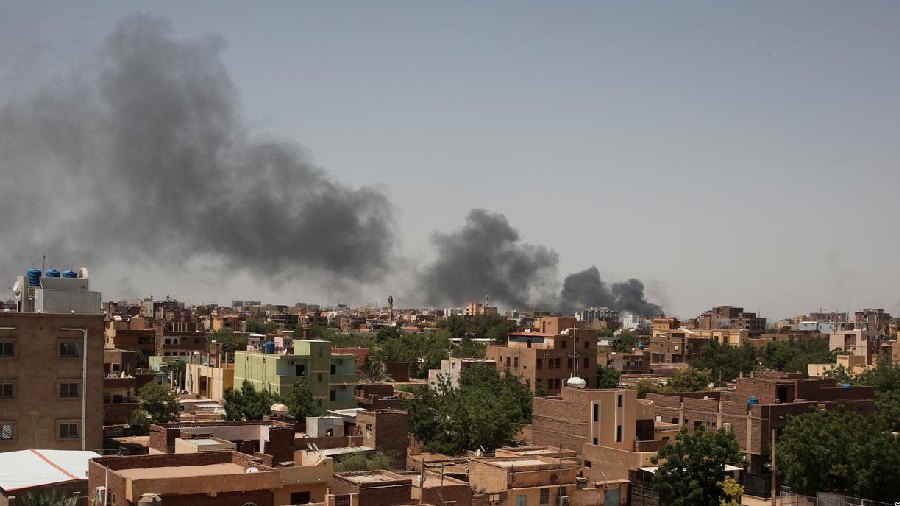When rival generals transform a city of five million people into an arena for their personal war, as two of them have in Sudan, civilians pay a heavy toll.
In the capital, Khartoum, gunshots have erupted outside apartments and rockets have screamed across city blocks, trapping people in their homes as food supplies dwindle. At the airport, smoke billows and flames roar as commercial planes come under attack. Foreign diplomats have started evacuating their staff, with some countries sending in special forces to assist.
As two generals with a longstanding rivalry vie for dominance, the clashes between a paramilitary group known as the Rapid Support Forces and the Sudanese Army have reordered the city with breathtaking speed.
They have also dashed hope that a country that appeared to be on the cusp of democracy will be able to usher in civilian rule any time soon. Even a cease-fire, despite repeated promises, has so far been out of reach.
Here is a look at what is happening in Sudan.
Where is the fighting?
Most of the fighting appears to be taking place in Khartoum, but clashes have been reported across the vast country — Africa’s third-largest by area, with more than 45 million people.
The civilian death toll from the fighting rose to more than 400, with more than 3,500 injured, according to the World Health Organisation. The real toll is probably much higher, officials say.
In Khartoum, the fighting has left many people stranded at home without electricity or water, and doctors and hospitals say they are struggling to cope. Fighting has been reported near the presidential palace, and it was still not clear who — if anyone — was in control of the country.
Aid workers and diplomats, who were often able to stay out of the Sudanese fray in past tensions, have this time found themselves targets.
The US military airlifted diplomatic personnel from Khartoum, President Joe Biden said on Saturday night. Saudi Arabia, Hungary and other countries have also moved their embassy staff members out of the country.
Who are the rival generals?
The leader of one of the two main rival factions is General Abdel Fattah al-Burhan, a powerful military commander who has for years been a de facto leader of Sudan.
Little known before 2019, General al-Burhan was closely aligned with Sudan’s longtime ruler, President Omar Hassan al-Bashir, and rose to power in the tumultuous aftermath of the uprisings that led to the ousting of the widely despised leader.
Before that, General al-Burhan had been a regional army commander in Darfur, in western Sudan, when 300,000 people there were killed and millions of others displaced in fighting from 2003 to 2008 that drew worldwide condemnation for its human rights violations and humanitarian toll.
After civilians and the military signed a power-sharing agreement in 2019, General al-Burhan became the chairman of the Sovereignty Council, a body created to oversee the country’s transition to democratic rule. But as the date for the handover of control to civilians got closer in late 2021, he proved reluctant to relinquish power; in October year, he and other military leaders carried out a coup.
General al-Burhan’s main rival is Lieutenant General Mohamed Hamdan, who leads the country’s Rapid Support Forces, a powerful paramilitary group.
Of humble origins, General Hamdan, widely known as Hemeti, rose to prominence as a commander of the notorious Janjaweed militias, which were responsible for the worst atrocities of the conflict in Darfur.
In October 2021, General al-Burhan and General Hamdan united to seize power in the coup, making them effectively the leader and deputy leader of Sudan. But in recent months, they have fallen out, clashing in public and quietly deploying extra troops and equipment to military camps in Khartoum and across the country.
Why are many other countries invested in the conflict?
Sudan is just south of Egypt and borders some countries also threatened by instability.
There are fears that the new chaos could draw in those neighbouring countries. In one murky episode, General Hamdan’s forces captured at least 30 Egyptian soldiers and seven warplanes at an air base in Merowe, about 200 miles north of Khartoum.
Egypt said the soldiers were in Sudan on a training exercise. A relative of General Hamdan’s said by phone that the detained soldiers were mostly pilots and aircraft mechanics who had come to Sudan to carry out airstrikes on behalf of the Sudanese military. Those claims could not be verified, but the events made clear the volatility of the conflict.
Already, the violence has spread deep into Darfur, a region in the western part of the country that for 20 years has been tormented by its own cycle of conflict. Darfur is home to several rebel groups that could get sucked into the fight, and it has also been a base for the Wagner private military company, the private Russian military outfit.
New York Times News Service











